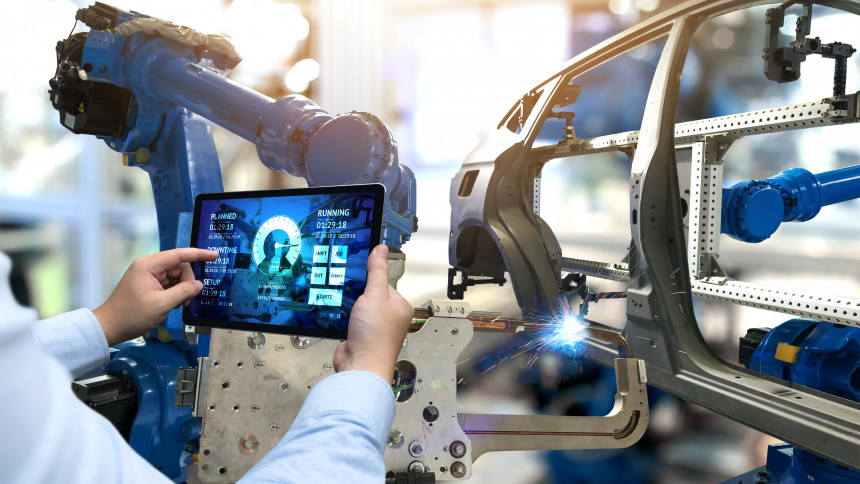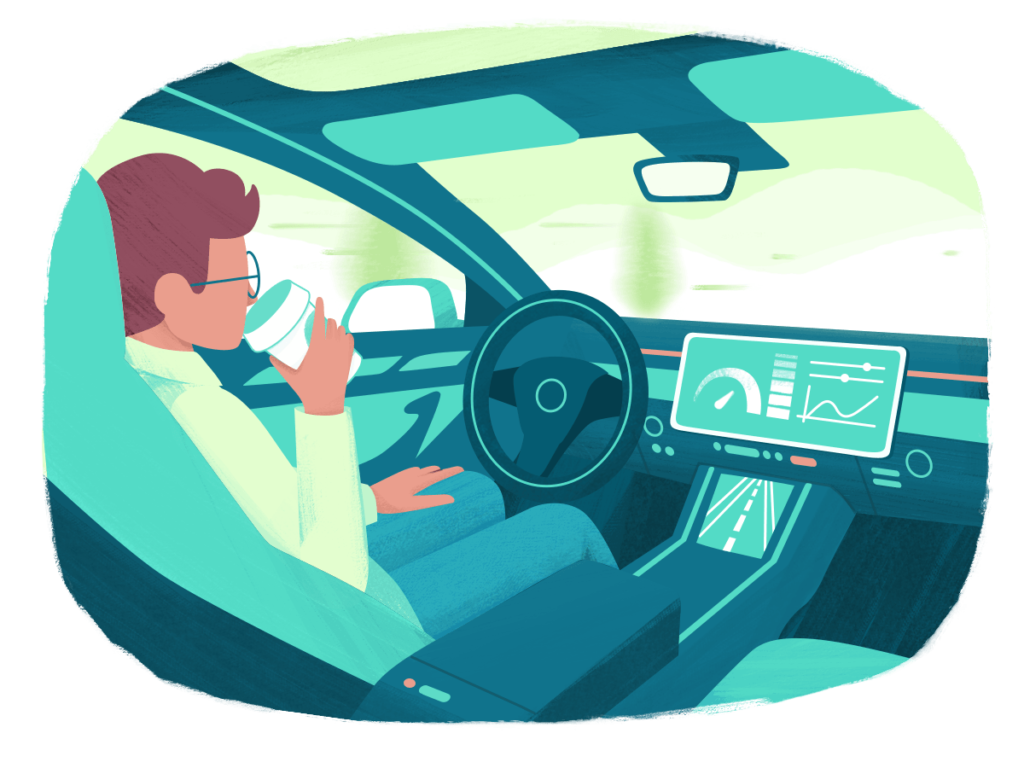Introduction:
AI is now used in almost every aspect of our technical lives, and in every facet of the car manufacturing process as well. As a technical society, we depend on AI for a variety of purposes, but I would like to focus on how AI has changed the automotive industry over the past couple of decades.
History:
Automobiles became common in the early 20th century when the famous Model T was created. Soon after, the 1920s brought a tremendous growth in automobile ownership with over twenty-three million registrations worldwide towards the end of the decade. Since then, automobiles have gone through significant changes and have become much safer to drive. Some of the first notable changes were in the assembly of automobiles in 1913, to changing the materials used for car components. Redesigning the gear shift from stick to automatic transmission created a surge in the purchase of automobiles. Numerous car manufacturing companies grew, such as Ford or Chevrolet who experienced vehicle production of over a million units in the 1940s. The addition of air conditioning and heating in cars went from being a luxury to a necessity post World War II. Now, only 1% of passenger cars do not have air conditioning, and for all the cars that do have these cooling units, their system is highly advanced with features such as dual and rear climate control. All these changes over the last century culminated to create the innovative vehicles we drive today, but the automotive industry will continue to change as society and AI progresses globally.

AI in Factories:
The utilization of artificial intelligence is not only used for cars when they are on the road, but more importantly in the factories and machines used to build them. According to Rethink Robotics, an automotive company based in Germany, their robots are used for tedious tasks in the factory such as “supply chain issues, tending machines, handling materials, performing tests, and packing finished products”. Many of these industrial robots can work more efficiently than humans, resulting in a quicker and more efficient production process.
Issues in supply chain are imperative to prevent and detect, since a single breakdown can result in a domino effect and add more costs for a company. With the assistance of AI, logistics and inventory tracking and management is regulated much more easily, and employees in warehouses or factories are updated and more aware of any issues that may arise.
Automotive testing includes several AI capabilities. The most commonly used process for this is called model-based testing, which includes artificial intelligence and machine learning systems. The AI component of this testing procedure allows software to become more accurate in predicting certain conditions, and the ML algorithms use historical data as input to predict outcomes.

AI in Cars:
The rise of AI led to a significant increase in autonomous and semi-autonomous cars. Most popular of these self-driving cars is a Tesla model. But how exactly are AI algorithms used in testing these vehicles before they are available to the public?
One article published through Stanford University focuses on “How AI is making autonomous vehicles safer” and mentions how “algorithms take an adversarial approach, trying to find weaknesses”. Developers use a falsification method to create validation algorithms to search for any way a system might fail, or in this case, any way a car may crash. Another method of testing using AI is called “compositional validation” whereby individual components are tested separately to ensure efficiency and overall success in the system safety.

Impacts on Automobile Businesses:
After discussing various aspects of the automobile industry and how AI plays an integral part in its innovation, it is important to note how these changes have affected automobile businesses and their demanding consumers. Now that most cars are equipped with safety technology, such as a blind spot detectors, reverse cameras, dynamic air conditioning, adaptive cruise control, lane-keeping assist, and central airbag improvements, consumers are not settling for less. Competition amongst large and renowned car manufacturers has driven the automotive industry to automate even more in the hopes of appealing to more consumers. Families with younger children or young adults who are learning how to drive are searching for safer vehicles provided with technological solutions, and with the help of AI, Toyota, Honda, BMW, Kia, and many other companies are rapidly expanding their scope for the design and implementation of their products. Artificial intelligence has brought our technical society very far, but innovators have yet to cease improvement.
Sources:
https://hai.stanford.edu/news/how-ai-making-autonomous-vehicles-safer
https://usmsystems.com/ai-in-automotive-industry/
https://www.forbes.com/sites/forbesbusinesscouncil/2022/04/19/three-ways-ai-is-impacting-the-automobile-industry/?sh=2e0f4f834a73
Hey Nazneen, I absolutely enjoy how you built up your blog in chronological order so we could get a big-picture look at the automotive industry to date. Automation through artificial intelligence is huge right now with car companies investing millions into research in order to get ahead or their competition. The statement you made about AI being beneficial in the way that it protects its cars was a great observation. I would love if you could also maybe delve a little deeper into what companies these car companies are purchasing the tech from or are they created by the companies themselves, which way is cheaper?
Hey Nazneen, this was an awesome post! I think things like the assembly line obviously had a huge impact on the way automobiles are implemented into our everyday lives. I say this as AI has been almost co-parenting the technology as we can see more efficient building processes. I think autonomous vehicles are such a cool technology and have dramatically increased competition. I wonder at some point if we will start seeing the crashes in the future come down because of all this new safety technology or if is it something unavoidable.
Hi Nazneen. I really enjoyed reading your post this week. Last semester, I did research for another class regarding manufacturing and AI. Although my research wasn’t as specific as AI in the automotive industry, I saw similar themes for AI in the manufacturing industry as a whole. For example, I saw the AI could be used for machine maintenance as a way to predict which equipment needed maintenance instead of just doing it on an annual/semi-annual/etc. basis. One static I found was that AI could provide a “75% reduction in maintenance windows, 28% reduction in annual maintenance spending, and 30% reduction in parts maintenance”. I also saw that AI could be used for maximizing productivity by helping with logistics optimization. An example of this would be AI’s ability for more accurate capacity planning and price forecasting.
There is some incredible technology coming to the automotive industry and I think our generation is going to need to be prepared to react to these changes. However, I am not sure how well I will adapt to self-driving cars and such, hopefully, it is smoother than I anticipate but I do not like the feeling of not being in control, so it will definitely take some getting used to!
One of my doctoral advisors often said “the best way to understand the impact of digital technologies is from a running start.” That is, you really need to understand the history of the industry as a whole to understand how digital will affect it. Really nice post going back to the model T and bringing it into the future. Great work!
When researching for my article this week I also found a lot of information on how AI is used in in the automotive manufacturing sector. It is really cool to see how all the automated processes are done, which makes the entire manufacturing process way more efficient.
Hi Nazneen, this was such a good read! I’ve heard a ton about AI being used to innovate new features in cars, but have never heard this much about it until reading your post. We all know about Tesla, but don’t really hear much about how other companies like Toyota and Kia are stepping their game up within the industry using AI. I agree that this game changing technology will allow parents and people in general to feel safer and more secure when on the road, and hopefully these advancements will prevent accidents on a larger scale. I am looking forward to hearing more about these innovations!
Hey Nazneed, this was such an interesting post to read! I love the idea of AI helping out with many aspects of our lives, and the automobile industry is high on that list. AI is going to continue revolutionizing not just cars, but all sorts of travel methods. I’ve had the opportunity to ride around in a Tesla with upgraded self-driving features, and it still seems so futuristic. It’s crazy to think how that will be pretty normal 10 years from now. I would have liked to hear more about specific cars/manufacturers, so I might go check some of those out in leu of your post. Great job!
Hey Nazneed, this was a very intriguing article to read because it is something that will affect our society for many years to come. It was interesting to read about the compositional validation method. It shows how innovators are constantly working and trying new methods to increase functionality and the safety of autonomous vehicles.